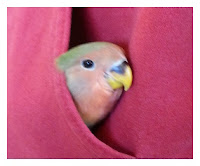Over the
last couple weeks, he has had only minor changes in his appearance. The black coloration on his beak has begun to
subside, leaving only a small patch on a bright yellow background. His tail and wing feathers have completely
grown in, leaving him fully feathered.
He has definitely learned the finer points of his wings, flying where
ever he pleased in our lobby and at home; so much so, that he had to have his
wings trimmed to avoid flying out the door or
into the waiting mouth of a hungry cat!
Thursday, February 28, 2013
Wasabi is now 7 weeks old and making friends!!
Monday, February 11, 2013
Wasabi is now 5 weeks old!
At 4 1/2 weeks, Wasabi has
fledged! He has become very active,
wanting out of his cage more, and consistently exercising his wings. He has been able to jump up to the edge of
his open topped cage, and able to perch there while being fed, with out issue. His balance is vastly improved and he is
beginning to learn the basics of flight, such as turning and landing, in short
distances. He has graduated to an actual
cage, although he still spends most of his time on the floor with toys and soft
places to cuddle up. We will watch him
as he continues to learn the finer points of having wings, and builds up his
muscles, until it becomes a danger to have him fully flighted in the
clinic. At that time, we will trim a few
of his feathers, a few times a year, so that he isn't able to fly into the
mouth of a hungry cat, or out into the snowy temperatures.
We have all become comfortable with calling Wasabi "he", but
we have decided to him sexed. DNA will
be extracted from a small blood sample, and analyzed at a lab. As in people, bird gender is determined by the
sex chromosomes. Females have two different sex chromosomes (called “ZW”),
while males have two of the same sex chromosomes (called “ZZ”). We should know in about 2 weeks whether our
assumptions have been correct!
Monday, February 4, 2013
Our Love Bird is growing!
 We do not
know what sex our companion is. Lovebirds,
as with the majority of parrots, do not have any sexual dimorphism, that is,
visual differences to determine male from female. Because of this, the only accurate way to
know is either DNA testing or surgical sexing.
Without knowing, it has been a little bit of a challenge picking a name
that fits, but that hasn't stopped several names being thrown into the mix;
Franklin, Munchkin, Guacamole... but Stephanie came up with the one that seems
to fit the most, Wasabi! He does have a
bit of a spicy personality, after all.
We do not
know what sex our companion is. Lovebirds,
as with the majority of parrots, do not have any sexual dimorphism, that is,
visual differences to determine male from female. Because of this, the only accurate way to
know is either DNA testing or surgical sexing.
Without knowing, it has been a little bit of a challenge picking a name
that fits, but that hasn't stopped several names being thrown into the mix;
Franklin, Munchkin, Guacamole... but Stephanie came up with the one that seems
to fit the most, Wasabi! He does have a
bit of a spicy personality, after all. Wasabi is now able to climb out of his nest on his own, and is
beginning to explore his surroundings. With his new feathers, he doesn't need
to be in an incubator during the daytime.
Instead, he is getting to meet all kinds of new people, while residing
on the front desk. He is very curious about new objects and
things placed within his reach, but still prefers to be nestled somewhere cozy
for his naps.
Wasabi is now able to climb out of his nest on his own, and is
beginning to explore his surroundings. With his new feathers, he doesn't need
to be in an incubator during the daytime.
Instead, he is getting to meet all kinds of new people, while residing
on the front desk. He is very curious about new objects and
things placed within his reach, but still prefers to be nestled somewhere cozy
for his naps.
He is
still being fed a formula that is made specifically for parrots, by syringe,
every 3-4 hours during the day. Now, at
night, he is able to go a little over 6 hours in between feedings. After eating, Wasabi thinks that it's time to
play, exercising his wings and running around, usually without much grace. Next time you're in the office, don't forget
to say hello!
Subscribe to:
Posts (Atom)








